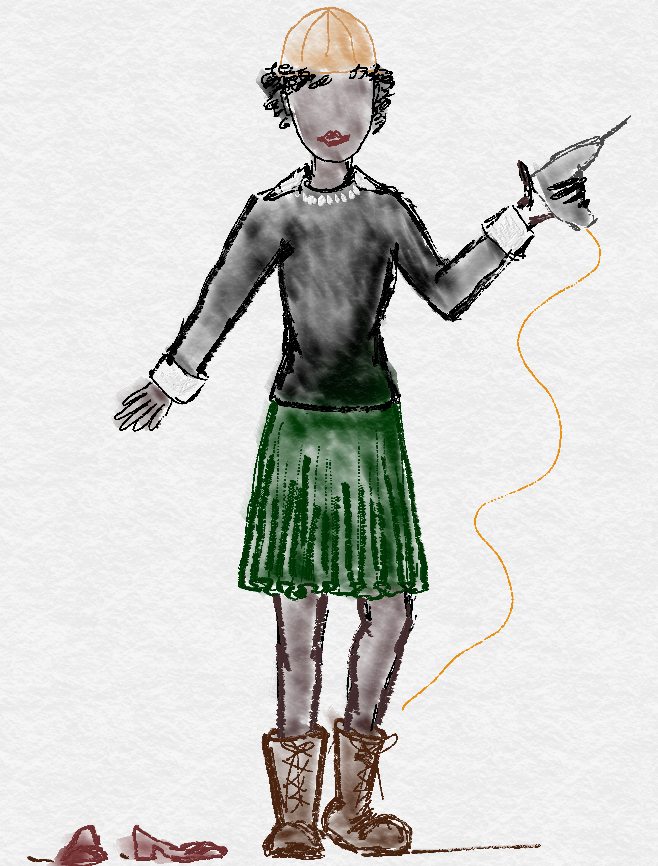perfection
Damaged
Bent, Folded, and Fine

During the past few months, all of my available Underpinnings time has been consumed with work on a video for the DFI Women in Deep Foundations Committee to educate women and girls about our field. Every bit of my “Go Team!” energy has been focused on that effort, so blog posts have been moved to the side. Until last week.
I happened to be scrolling through news headlines on my phone while sitting through a particularly painful meeting when I spotted a story about actor Ryan Phillippe’s court case. The headline mentioned something about ex-wife Reese Witherspoon being drug into the mess, and I immediately went from zero to furious, assuming his turmoil was unfairly spilling over onto someone who had managed to pull herself out of his dysfunctional orbit. What I found had nothing to do with Witherspoon but made me even madder.
The gist of the saga is that Phillippe and an ex-girlfriend both claim the other engaged in harassing behavior. Text messages were brought in as evidence. One of Phillippe’s messages to his then-girlfriend was listed in the article as,
“…you’re too great as you are bb. you’re so smart and funny and complicated and damaged, and stunningly beautiful – all traits i find the most engaging and attractive.”
And that’s where I went through the roof.
Have you noticed the use of the word “damaged” in our current culture? It is often brought up in book reviews and synopses, describing the heroine of a touching memoir or the main character in a dark romance. “This book explores how the damaged, fragile young artist finds her way back to creating a real relationship after she thinks she has lost all hope,” – or some such nonsense. Movies capitalize on the idea, sometimes even working the word “damaged” into exposition.
Have you also noticed that the same word is rarely used to describe a man? No, damaged is all about women. It’s an expression conveying tragedy or heartbreak or mistakes that somehow have managed to ruin the main character. But ruined for what? What does damaged actually mean? More importantly, why has the term become accepted as some sort of romantic asset?
The word damaged typically means that someone or something is no longer in perfect condition. To take it a step further, it conveys the idea that someone or something no longer works properly.
Either definition begs the question, “What is perfect? What is proper working condition for a human being?” To be more pointed about it, what is “undamaged” condition for a woman?
We all are aware of societal stereotypes regarding the “perfect” life for a woman. You grow up in a loving house and work hard to be an obedient, accomplished young lady. You develop into a well-behaved woman who maybe has a tasteful career or maybe doesn’t. You have several beautiful children with a fabulous man, and you spend every last lick of energy giving them perfect lives and telling the world how #blessed you are. You are upheld as a paragon of selflessness and good sense, and you are told that you are beautiful when you spend what little time you have for yourself on getting your hair and nails done in whatever is the currently-accepted fashion.
So what constitutes damaged? Based on my study of current books and movies using the term, damaged involves a woman who made a bad decision and took a turn off that “perfect” life route. Damaged includes women who have dealt with emotional problems and diseases like addiction. Damaged includes women who have been victims of other people’s problems, women who have been beaten and oppressed and ignored. Damaged also covers women who have made a decision that led to problems, even when those problems weren’t of their own making. Damaged is anything beyond “perfect.”
Wait – isn’t that just life? Isn’t life all about making mistakes and learning from them? Aren’t we supposed to mature and evolve and get smarter as we get older? You don’t do that by sitting in a bubble and conducting a faultless life unscathed by reality.
Somehow we reached 2019 and we have managed to hang onto the term “damaged” to describe women who have strayed from some outdated norm. Let’s face it – the label is actually a shortened version of the term “damaged goods,” a phrase that used to pertain to women who were unmarriageable because they weren’t virgins. Even if they were the victims of horrible crimes, they were considered soiled and unworthy of a respectable match. So they were tossed out as defective, basically useless in polite society.
We have to be the advocates who reinforce the idea that women can make mistakes and have problems, just like men, and that doesn’t make them damaged. Furthermore, we can take paths in life that are not exactly like the #blessed route AND THAT’S OKAY. That woman who struggled with insecurity in high school and developed an eating disorder? She has learned to deal with her issues, and she is strong now. The girl you knew who misunderstood the jackass she married and found out too late that he settled arguments with his fists? Her scars are proof that she survived, and she can handle anything you throw at her now in your high stress work environment. And your old friend who wandered between majors in college and “lost” 10 years figuring out what she wanted to be? She probably knows more about herself than the average bear and will navigate the rest of her life with a clear vision. And that woman you know through work who unknowingly married an alcoholic and finally divorced him, only to marry another control freak because she had lost all perspective on what a good relationship was? Well, that’s me, and I’m just fine now. My life probably hasn’t looked like yours, but I’ve learned a lot and I have a life full of outstanding people.
The more sinister side of acceptance of the “damaged” label is the cultural use that is disguised as a romantic tribute by men who are actually hoping to control the woman in question. They act as though a “damaged” woman is more complex. Phillippe composed his text ode to his girlfriend as if he were saying how wonderful she was. But by calling her damaged, he was inferring that she was less than perfect. Men that use the term in this passive-aggressive way intend to reduce a woman’s confidence by reinforcing her imperfections, even if they profess to love those same flaws. It’s an insidious, degrading tactic that is anything but romantic. And books and movies that employ the same technique are no better. We must push back against this. Enough with calling the interesting movie heroines “damaged.” Has anyone ever called Batman damaged? No, he’s just dark, which is exciting.
The basic problem with the use of this word is that it implies that someone is not perfect. And that idea suggests that perfection is not just attainable but quantifiable. We, as women of 2019, should be able to just live and work and play and love. Perfection should not be a goal. Someone else’s idea of perfection should be something to avoid. And using someone else’s idea of perfection as a weapon for control should be a crime.
Perfection, Part II
Are These Our Only Two Choices?

No doubt you have taken part in at least one discussion, if not endless discourse, on the cultural rift we have today between our Millennial generation and the rest of the world in the working environment. Trust me when I say I understand why this division exists, because I have analyzed and investigated and listened until I can’t stand to hear the phrase “work-life balance” one more time. I get it, and I understand it. Whether or not I agree with many of the current recommendations for coping with it is a minefield for another time.
Pertinent to our exploration of perfection here at Underpinnings is a thread that runs through most examinations of why Millennials act the way they do – the idea that we, the parent generation, are at fault. As a friend of mine so aptly put it, “We always swore up and down that our kids wouldn’t have to work as hard as we have. Well, they don’t. At all.”
Before this turns into an ugly digital brawl over whether or not Millennials are worthless slackers or hapless victims, (do you love the fact that those are the only two choices?), I would divert your attention to the same hypothesis, but for a different issue. Are we, the parents of the next generation of brilliant women, promoting perfection at the expense of personal growth and societal improvement? And are we doing it to spare ourselves from pain?
Many of us in the GenX and Baby Boomer categories have fought some bloody battles to get where we are and to smooth the way for women behind us on the moving sidewalk of life. We remember when a woman would have very little recourse if a man on a construction site said something vulgar or, worse, didn’t pay any attention to her engineering recommendations. We’ve had our asses grabbed and our chests groped, and we have been on the receiving end of drunken kisses from superiors at professional events.
So things are better now, right? And that’s a good thing, right? But are we, ourselves, sabotaging more progress by reinforcing the notion of perfection in our daughters, our protégées, and our co-workers?
The connection between the quest for perfection and problems with sexism have played around the edges of my brain for a long time. There was something there that was truly bothering me, and I knew it was a very basic, very ugly problem. It took a lot of runs and hours on the Treadclimber to jar the pattern out of my observations. When I finally felt like I had made the connection I was sensing, it came down to two issues: stereotypes and sex.
Yes, we cheer on young women now in a variety of previously male-dominated fields. If you are the top of your class and you get promoted to district manager at 25 and you receive an award for Young Contractor of the Year, the world will give you a medal and call you legitimate. But if you are a female and you’re not in the top 10% of your class, chances are you will not get a rousing round of encouragement to “go for it.” Why? Because we all know that even in 2018, a woman has to excel to be considered average in a man’s world. A woman who does not excel will not be considered average, she’ll be viewed as dead weight. So, as often occurs, her loving family discourages her from moving forward in a career environment that they know will be difficult. Our message: If you’re not brilliant, you’re a failure. Even worse – if you’re not brilliant, you need to settle for being just a wife and mother. (As if being a wife and mother is easy or unimportant or settling). Why are there only two extremes? Because parents and mentors don’t want their loved ones to be hurt. So we drive drive drive the young ladies to get perfect grades and be class president and captain of the lacrosse team. And when our daughters get average grades and express interest in “unimportant” things like teaching or fashion or interior design, we write them off. (Where would we be without teachers???) Or when they get average grades and still want to be engineers, we discourage them. It will be too hard, we think. Being who they are isn’t enough to break the glass ceiling, so being who they are isn’t enough. We then relegate their career importance to whatever children they may someday have.
I work with a lot of men who aren’t very smart. (Insert jokes here). Many of them are successful because they work hard, they’re creative, and they come up with unique solutions to problems. There’s no reason to think that a female engineering student with middling grades couldn’t achieve in the same manner. But we know she’ll be underappreciated at the start, and we don’t want her to get discouraged. So we recommend different routes. We imply that anything less than perfection isn’t good enough to join our sisterhood.
The other side of this issue involves our personal, not professional, expectations of our younger generation. One could (try to) make the argument that some parents press their children of both sexes to be top notch academically and give up when they aren’t. But no argument can be made that we view our daughters and sons equally when evaluating their personal decisions.
Take pregnancy. Obviously, all parents and mentors want their young people to become parents when it is appropriate and feasible financially. (Spoiler – it’s never financially feasible to be a parent). But if a boy gets his girlfriend (or Friday night hookup) pregnant, chances are his family will be upset, but mainly concerned about how he’ll be able to support the child and how it will affect his future. If a girl gets pregnant by her boyfriend, her family is worried about the same things, but they are also ashamed. They are disappointed in her. As much as you can try to say that the concern is just about her future, 9 times out of 10 the parents and friends are disappointed in her moral choices. She let someone touch her. If the boy was a Friday night hookup instead of a boyfriend, the shame is tenfold. You can try to say all day long that all of the crying is about practicality and futures and finances, but you cannot deny the fact that many parents will look at their daughters differently in these situations. She had sex. Everyone will know. So they push their daughters to be perfect. Don’t dress improperly. Don’t flirt. You don’t need to pay attention to boys, you need to study. Isn’t it great that my daughter isn’t interested in boys?
A sad component of this problem is our own selfish worries about what others will think. “They’ll think I’m a bad parent.” “People will know my daughter decided to have sex and they’ll think less of me.” Needless to say, such concerns are shallow and only reinforce sexist societal attitudes.
Along with shame from pregnancy comes fear of our young women being seen as sexual beings at all. Our sons get lucky with a hot girl at work? At least one person will say, “Atta boy.” You find out your daughter had sex with a construction worker on one of her sites? Instead of, “Well, that wasn’t brilliant, but making mistakes means learning,” we say, “Who knows about it? Oh no. You’ll be ruined.” (No one EVER says, “Atta girl.”) In many cases, she will be ruined. Because we, the older generation, are freaking out about the fact that an adult woman in a free society made a choice. Again, you can say all day long that we are just trying to protect her, but perpetuating double-standards isn’t protection. It’s fear. We are limiting our daughters’ freedom because we are afraid they’ll get hurt, and that hurt will hurt us.
Our over-protection is just another version of trophies-for-everyone, no-grades-until-fourth-grade, and gifts-for-every-party-guest. Our generation and the generation before us got where we are by dealing with the ugly side of sexism in the workplace and in society. If we want progress to continue, we have to allow the current generation to participate. Let your young protégée take that job with that nasty old superintendent, and let her figure out how to show him who’s boss. She’ll probably make some mistakes, and she might even end up quitting the job, but at least she got out there. Support your daughter when she admits that she hates school and she’s always dreamed of being a magician on a cruise ship and VIEW HER CAREER AS VALID. Treat your niece like the shining star she still is when she comes home from Coachella pregnant. She is a smart, strong, ball-buster, and she’ll figure out a way to get her PhD in agronomy with a toddler on her hip. We have to stop telling our girls that their only two choices are perfection and mediocrity. And we need to respect them as the fierce individuals that they are instead of trying to cram them into some ideal that helps us sleep at night.
Perfection, Part I
I Just Want It To Be Perfect

When I was young I used to haul around a sketch pad with me everywhere. I spent hours and hours drawing…dresses. I was fascinated by fabric and design and endlessly intrigued by art that one can wear. As I grew older, I found out that my passion for art was balanced by my interest in science and engineering. I thought the Great Pyramids were beautiful, but I also constantly found myself saying, “But how did they build that?” I think you know which direction I chose when I hit the unavoidable fork in the career road in college.
My artistic beginnings are probably some of the reasons I’m such a big fan of the TLC show “Say Yes to the Dress.” No, it’s not the family drama. It’s not the suspense. (Will she find a dress?! Or will she go to her $150,000 wedding in a sundress from Target?) It’s truly the dresses. At the end of a long week when I’m trying to decide if I want to be an engineer again on Monday, I can sit on the couch on Friday night and say, “Ooo – look how well that drapes!”
On the other hand, the quickest way for me lose my Friday night happy coma is for one of the brides to implore, “But I just want it to be perfect!” This statement typically is said in the same tone a defeated peasant uses as she watches the invading army ride into town – “I just hope they let some of us live!” The desperate brides who use this phrase lead us to believe that their lives will be over if every detail in their weddings is not exactly as they have envisioned it. The cynic in me often yells at the screen, “You mean not perfect, as in something might happen that you haven’t imagined in your short, limited little life? Something that might be better than what you dreamt of in your narrow-minded pursuit of an impossible goal but that you’ll be too myopic to appreciate?!” Okay, I try to keep my blood pressure low by ignoring this part of the episodes, but sometimes I can’t help it. And it seems as if this illusion of perfection is everywhere these days. It drives me crazy. More importantly, it seems to me that the goal of perfection is much more prevalent among women than among men.
My distaste for this idea of perfection turned into a more mature interest when I heard this TED Talk. Throughout Ms. Saujauni’s presentation, I kept saying, “Yes! Yes!” The idea of having to attain perfection is much more than a dramatic moment on a Friday night reality show. Her insights made me see that my revulsion on Friday nights was a response to a much larger condition than simply a tulle vs. silk predicament. Soon after I listened to her talk, I read this post . I think both ladies have very similar messages, and I think we need to sit up and take notice, for our daughters’ sakes.
Human beings are, by definition, imperfect. Our world also is imperfect. We might use the word with abandon when it comes to spring days and d’Orsay heels and men who play James Bond. But the truth is that none of those things and none of this world actually are perfect. And those who pursue the nonexistent are doomed to the frustration of futility.
So why do we ask our daughters to be perfect? Why do we encourage them to attempt only things in which they have some chance of succeeding? Why do we do everything in our power to protect them from making mistakes? Why are we so petrified that they will make mistakes?
As a perpetual optimist, I like to think the root of this problem is in biology, not in maliciousness. As our species was becoming established, it was necessary for women to be as “perfect” as possible to be attractive to potential mates. Women who did not reproduce and who weren’t married often did not have the protection of a man and could end up in dire straits. Families wanted to make sure their daughters didn’t end up poor and at the mercy of a less-than-benevolent society, so they pushed them to be without any possible flaws that could be construed as unsuitable for a potential mate.
This anthropological analysis (without any expertise to back it up), would explain an 1850s frontier family’s extreme concern over their oldest daughter’s penchant for wearing men’s pants while doing her farm chores. In 1850, the negative reaction from the rest of the people in the small prairie town could lead to more than just some counseling sessions over bullying at the general store. Being unmarriageable on the frontier could lead to problems for the whole family, including lack of protection from hostile raids and exclusion from pooling of resources.
But this isn’t 1850. Even if your grandmother scolds you that you won’t find a man with hands that dirty (I proved her wrong more than once), the family is not likely to end up starving and surrounded by pirates/bandits just because you spend your days smeared with unladylike mud from various construction sites.
And yet, we continue to hold onto this idea of perfection. We cringe at the thought of our daughters doing anything to generate negative attention. If I hear “But in this age of social media, their mistakes will follow them everywhere” one more time I’ll scream. Yes, your mistakes will be preserved for all eternity, but so what? They are mistakes. By teaching our daughters that mistakes should be avoided and covered up at all costs, we are telling them that they are not okay if they make a mistake. We are saying that evidence of a mistake made 15 years ago might very well ruin an entire life. And, in doing so, we discourage them from taking risks. We teach them not to be brave.
I would be willing to gamble some hard-earned pennies that most of the women reading this post who have succeeded in engineering or construction careers have felt during at least part of those careers that they could not make any mistakes. They knew that any one mistake, whether it be professional or personal, could spell the end of their careers. After all, there were many men just looking for reasons as to why those women shouldn’t be in their jobs. A mistake of any sort would provide just the ammunition a misogynist would need to say, “See? I told you she didn’t belong here.”
When was the last time you heard about a guy who slept with his secretary or his foreperson or his IT expert and it didn’t affect his job. The answer is yesterday. Even better, when was the last time you saw a male co-worker get completely ripped at a company party and dance around with the proverbial lamp shade on his head? Again, the answer is yesterday. Many people would say, “Wow, that guy…” as they chuckled to themselves. But the philanderer and the drunk both would keep their jobs. “But, he’s good at his job, right?”
Now put a woman in both of those scenarios. She’s not going to survive either one of these incidents. Because both involve mistakes. And both involve a lapse in judgment, which we are not allowed to have. “What else will she do? She might end up sleeping with the whole second floor IT department! And if her judgment is bad in this area, how can she possibly size a beam for a load test? Off with her head!”
So we tell our daughters to be strong and ambitious and go get a great career….as long as they do it perfectly. If any mistakes are made, we’ll hire social media experts to wipe away the evidence, and we’ll spirit the girl off to an isolated location for trauma control. Yes, go get that engineering degree from Berkeley, but be sure to get straight As and make sure you agree with everyone you encounter. They’ll call you a star if you’re perfect! Of course, you’ll never have an opportunity to learn from any mistakes, and your risk-avoidance will prohibit you from trying anything new or innovative. But have a great life!
Is this what we want? I know I don’t. Over the years some of my most spectacular mistakes have taught me the most. And I don’t want the false sense of security that I’m only okay if I’m perfect, which I’m not. (I think there is a full astral plane between me and perfection).
So what do we do about this? Or do we do something about this – is perfection the right goal? Stay tuned for Part II.


